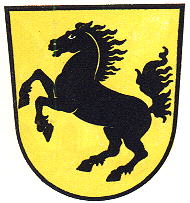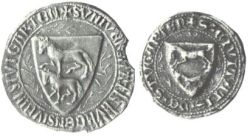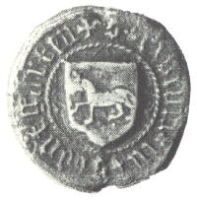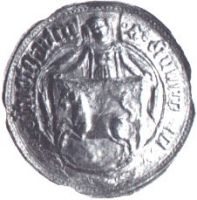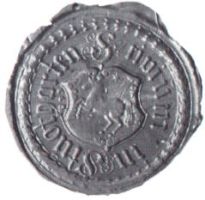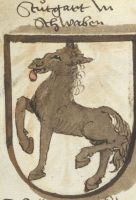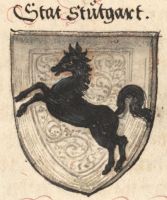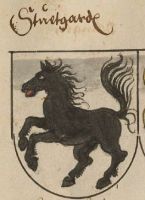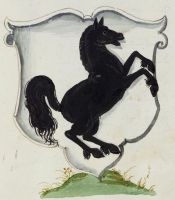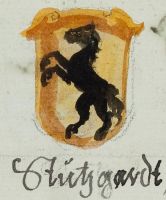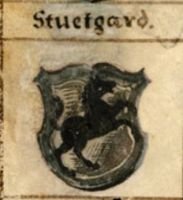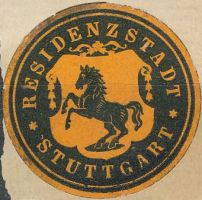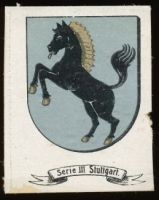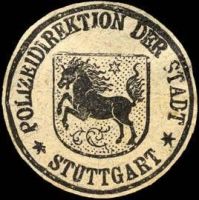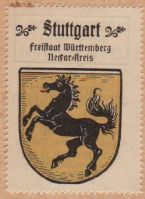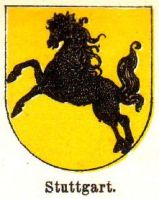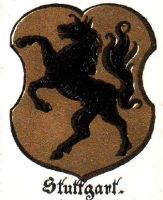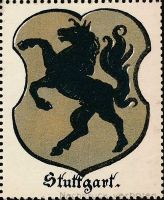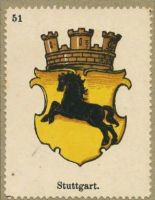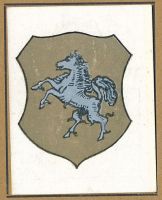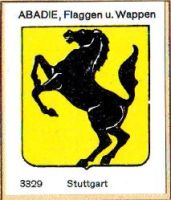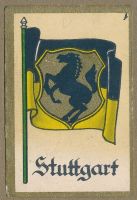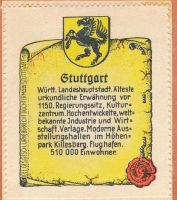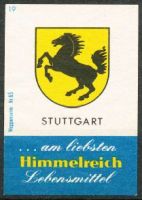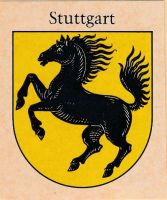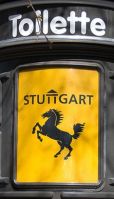Stuttgart: Difference between revisions
Knorrepoes (talk | contribs) m (Text replacement - "50 pxCategory:Baden-Württemberg" to "Category:Baden-Württemberg") |
Knorrepoes (talk | contribs) |
||
| (23 intermediate revisions by the same user not shown) | |||
| Line 1: | Line 1: | ||
{{ | {| class="wikitable" | ||
''' | |- style="vertical-align:top;" | ||
|[[File:stuttgar.jpg|center|350 px|alt=Wappen von {{PAGENAME}}/Arms (crest) of {{PAGENAME}}]] | |||
| | |||
<center>''' {{uc:{{PAGENAME}}}} '''</center><br> | |||
'''Country''' : Germany [[File:germany.jpg|60 px|right]]<br><br><br><br> | |||
'''State''' : [[Baden-Württemberg]][[File:badenwur.jpg|60 px|right]]<br><br><br><br> | |||
'''District (Kreis)''' : Urban district (Stadtkreis)<br><br> | |||
'''Additions''': (to see click on expand)<br> | |||
<div class="mw-collapsible mw-collapsed"> | |||
* 1901 [[Gaisburg]] | |||
* 1905 [[Bad Cannstatt]] | |||
* 1905 [[Untertürkheim]] | |||
* 1905 [[Wangen (Stuttgart)|Wangen]] | |||
* 1908 [[Degerloch]] | |||
* 1922 [[Botnang]] | |||
* 1922 [[Hedelfingen]] | |||
* 1922 [[Kaltental (Stuttgart)|Kaltental]] | |||
* 1922 [[Obertürkheim]] | |||
* 1929 [[Hofen (Stuttgart)|Hofen]] | |||
* 1931 [[Münster (Stuttgart)|Münster]] | |||
* 1931 [[Rotenberg (Stuttgart)|Rotenberg]] | |||
* 1931 [[Zuffenhausen]] | |||
* 1933 [[Feuerbach (Stuttgart)|Feuerbach]] | |||
** 1929 [[Weilimdorf]] | |||
* 1933 [[Mühlhausen (Stuttgart)|Mühlhausen]] | |||
* 1933 [[Zazenhausen]] | |||
* 1937 [[Heumaden]] | |||
* 1937 [[Rohracker]] | |||
* 1937 [[Sillenbuch]] | |||
* 1937 [[Uhlbach]] | |||
* 1942 [[Birkach]] | |||
* 1942 [[Möhringen (Stuttgart)|Möhringen]] | |||
* 1942 [[Plieningen]] | |||
* 1942 [[Stammheim (Stuttgart)|Stammheim]] | |||
* 1942 [[Vaihingen (Stuttgart)|Vaihingen]] | |||
** 1936 [[Rohr (Stuttgart)|Rohr]] | |||
<br> | |||
</div> | |||
{{#display_map:48.7758,9.1785|width=250|height=250|zoom=7}} | |||
|} | |||
{| class="wikitable" | |||
|+Official blazon | |||
|- | |||
|'''German''' | |||
| blazon wanted | |||
|- | |||
|'''English''' | |||
| blazon wanted | |||
|} | |||
===Origin/meaning=== | ===Origin/meaning=== | ||
Stuttgart became a city in the 13<sup>th</sup> century and the capital of the Counts of Württemberg in 1312. From the same year the first seal is known. It shows 2 running horses. The two horses also appear in the two next seals, the lower horse being smaller than the upper one. It has been mentioned that the arms thus showed a horse and a foal, but it is more likely due to the shape of the shield that the lower horse is smaller. | Stuttgart became a city in the 13<sup>th</sup> century and the capital of the Counts of Württemberg in 1312. From the same year the first seal is known. It shows 2 running horses. The two horses also appear in the two next seals, the lower horse being smaller than the upper one. It has been mentioned that the arms thus showed a horse and a foal, but it is more likely due to the shape of the shield that the lower horse is smaller. | ||
The first seal with a single horse dates from 1433 and is so small, that there simply was no room for two horses. It is the first seal that shows only a single horse. All later seals until the end of the 18<sup>th</sup> century show a single horse. | The first seal with a single horse dates from 1433 and is so small, that there simply was no room for two horses. It is the first seal that shows only a single horse. All later seals until the end of the 18<sup>th</sup> century show a single horse. | ||
In the end of the 15<sup>th</sup> century a lady appears as a supporter behind the shield. The lady still appears in a seal from the end of the 17<sup>th</sup> century, but disappears in later seals. | In the end of the 15<sup>th</sup> century a lady appears as a supporter behind the shield. The lady still appears in a seal from the end of the 17<sup>th</sup> century, but disappears in later seals. | ||
Similarly, in some seals appears a small star, but this star also disappears in the late 18<sup>th</sup> century. | Similarly, in some seals appears a small star, but this star also disappears in the late 18<sup>th</sup> century. | ||
In a seal from 1642 the horse is first shown rampant, instead of running. Ever since the horse has been shown this way. | In a seal from 1642 the horse is first shown rampant, instead of running. Ever since the horse has been shown this way. | ||
| Line 35: | Line 63: | ||
A second horse appears again between 1750 and 1820. This time it clearly shown as a foal. This practice was also discontinued in the 1830s. Ever since the arms have not changed. | A second horse appears again between 1750 and 1820. This time it clearly shown as a foal. This practice was also discontinued in the 1830s. Ever since the arms have not changed. | ||
The horse itself is a canting symbol. Stute = female horse, and the name is supposed to have been Stutengarten, or garden of horses. Duke Ludolf of Schwaben founded, according to legends, in 950 a horse breeding center and riding school on the spot of the present city. | The horse itself is a canting symbol. Stute = female horse, and the name is supposed to have been Stutengarten, or garden of horses. Duke Ludolf of Schwaben founded, according to legends, in 950 a horse breeding center and riding school on the spot of the present city. | ||
The colour of the horse is known as black since 1490. The field historically was silver, but started to change to gold since 1618 and 1854 to have the same colours as the arms of Württemberg. In between, silver and golden fields are used both. <br/> | The colour of the horse is known as black since 1490. The field historically was silver, but started to change to gold since 1618 and 1854 to have the same colours as the arms of Württemberg. In between, silver and golden fields are used both. <br/> | ||
| Line 41: | Line 69: | ||
Furthermore, there are many variations of the arms known. First, the horse is sometimes shown facing left, instead or right. This was only seen in images, never on seals. The colours were shown in 1599 as red on a unrecognisable dark field. The actual shape of the horse varies widely, according to the style of the painter or sculptor. The arms were for the first time officially described in 1885 in the present colours and shape. The additions of smaller municipalities has not changed the arms. | Furthermore, there are many variations of the arms known. First, the horse is sometimes shown facing left, instead or right. This was only seen in images, never on seals. The colours were shown in 1599 as red on a unrecognisable dark field. The actual shape of the horse varies widely, according to the style of the painter or sculptor. The arms were for the first time officially described in 1885 in the present colours and shape. The additions of smaller municipalities has not changed the arms. | ||
===Image gallery=== | |||
| | <gallery widths=250px heights=200px perrow=0> | ||
| | File:stut1312.jpg|alt=Siegel von Stuttgart/City seal of Stuttgart|Two early seals of Stuttgart, from 1312 and 1343. | ||
File:stut1433.jpg|alt=Siegel von Stuttgart/City seal of Stuttgart|The first seal (1433) with a single horse. | |||
| | File:stut1482.jpg|alt=Siegel von Stuttgart/City seal of Stuttgart|A seal from 1482 with the lady as supporter. | ||
| | File:stut1750.jpg|alt=Siegel von Stuttgart/City seal of Stuttgart|A seal from the middle of the 18<sup>th</sup> century with the small star above the horse. | ||
| | File:Stuttgartjr.jpg|alt=Wappen von Stuttgart/Arms (crest) of Stuttgart|The arms in the Armorial Jörg Rügen (1495) | ||
| | File:Stuttgart1500.jpg|alt=Wappen von Stuttgart/Arms (crest) of Stuttgart|The arms around 1500 | ||
File:Stuttgart1530.jpg|alt=Wappen von Stuttgart/Arms (crest) of Stuttgart|The arms in a manuscript +/- 1530 | |||
File:Stuttgart1591.jpg|alt=Wappen von Stuttgart/Arms (crest) of Stuttgart|The arms in the Chorographia Württemberg (Wolleber, 1591) | |||
File:Stuttgart16.jpg|alt=Wappen von Stuttgart/Arms (crest) of Stuttgart|The arms in a [[:Category:Windhag city arms|16th century manuscript]] | |||
File:Stuttgart1596.jpg|alt=Wappen von Stuttgart/Arms (crest) of Stuttgart|The arms in 1596 | |||
File:stuttgartz1.jpg|alt=Wappen von Stuttgart/Arms (crest) of Stuttgart|Seal of the city from around 1900 | |||
File:stuttgart.cva.jpg|alt=Wappen von Stuttgart/Arms (crest) of Stuttgart|The arms in a [[Continentale Verlags Anstalt|German album]] +/- 1910 | |||
File:stuttgartz2.jpg|alt=Wappen von Stuttgart/Arms (crest) of Stuttgart|Seal of the city from around 1900 (with additional star !) | |||
File:stuttgart.hagd.jpg|alt=Wappen von Stuttgart/Arms (crest) of Stuttgart|The arms by [[Otto Hupp|Hupp]] in the [[Kaffee Hag albums]] +/- 1925 | |||
File:stuttgart2.jpg|alt=Wappen von Stuttgart/Arms (crest) of Stuttgart|The arms shown around 1900 | |||
File:stuttgart1.jpg|alt=Wappen von Stuttgart/Arms (crest) of Stuttgart|The arms shown around 1900 | |||
File:Stuttgart.sc.jpg|alt=Wappen von Stuttgart/Arms (crest) of Stuttgart|The arms in an [[Schuberts Album deutscher Staaten und Städtewappen|album]] from around 1910 | |||
File:051b.wsa.jpg|alt=Wappen von Stuttgart/Arms (crest) of Stuttgart|The arms in the [[Wappen-Sammlung Series 2 Cities and regions|Wappen-Sammlung]] (+/- 1910) | |||
File:18-2.kur.jpg|alt=Wappen von Stuttgart/Arms (crest) of Stuttgart|The arms in an [[Kurmark|album]] from 1930s | |||
File:3329.aba.jpg|alt=Wappen von Stuttgart/Arms (crest) of Stuttgart|The arms in the [[Abadie]] albums | |||
File:Stuttgart.kos.jpg|alt=Wappen von Stuttgart/Arms (crest) of Stuttgart|The arms in an [[Kosmos Deutsche Stadtwappen aus West und Ost|album]], 1950s | |||
File:Stuttgart.uhd.jpg|alt=Wappen von Stuttgart/Arms (crest) of Stuttgart|The arms in an [[Unsere_deutsche_Heimat|album]] from 1952 | |||
File:Stuttgart.him.jpg|alt=Wappen von Stuttgart/Arms (crest) of Stuttgart|The arms on a [[Himmelreich|matchbox label]] | |||
File:Stuttgart.pan.jpg|alt=Wappen von Stuttgart/Arms (crest) of Stuttgart|The arms in an [[Panorama Bilderdienst|album]] from 1968 | |||
File:stuttgart3.jpg|alt=Wappen von Stuttgart/Arms (crest) of Stuttgart|The arms used at present | |||
</gallery> | |||
[[Civic Heraldry Literature - Germany|'''Literature''']]: Stadler, K., 1964-1971; Bardua, 1973. | |||
{{de}} | |||
{{media}} | {{media}} | ||
[[Category:German Municipalities S]] | [[Category:German Municipalities S]] | ||
[[Category:Baden-Württemberg]] | [[Category:Baden-Württemberg]] | ||
[[Category:Stuttgart]] | [[Category:Stuttgart]] | ||
Latest revision as of 08:13, 18 February 2024
|
Country : Germany State : Baden-Württemberg District (Kreis) : Urban district (Stadtkreis)
|
| German | blazon wanted |
| English | blazon wanted |
Origin/meaning
Stuttgart became a city in the 13th century and the capital of the Counts of Württemberg in 1312. From the same year the first seal is known. It shows 2 running horses. The two horses also appear in the two next seals, the lower horse being smaller than the upper one. It has been mentioned that the arms thus showed a horse and a foal, but it is more likely due to the shape of the shield that the lower horse is smaller.
The first seal with a single horse dates from 1433 and is so small, that there simply was no room for two horses. It is the first seal that shows only a single horse. All later seals until the end of the 18th century show a single horse.
In the end of the 15th century a lady appears as a supporter behind the shield. The lady still appears in a seal from the end of the 17th century, but disappears in later seals. Similarly, in some seals appears a small star, but this star also disappears in the late 18th century.
In a seal from 1642 the horse is first shown rampant, instead of running. Ever since the horse has been shown this way.
A second horse appears again between 1750 and 1820. This time it clearly shown as a foal. This practice was also discontinued in the 1830s. Ever since the arms have not changed.
The horse itself is a canting symbol. Stute = female horse, and the name is supposed to have been Stutengarten, or garden of horses. Duke Ludolf of Schwaben founded, according to legends, in 950 a horse breeding center and riding school on the spot of the present city.
The colour of the horse is known as black since 1490. The field historically was silver, but started to change to gold since 1618 and 1854 to have the same colours as the arms of Württemberg. In between, silver and golden fields are used both.
Furthermore, there are many variations of the arms known. First, the horse is sometimes shown facing left, instead or right. This was only seen in images, never on seals. The colours were shown in 1599 as red on a unrecognisable dark field. The actual shape of the horse varies widely, according to the style of the painter or sculptor. The arms were for the first time officially described in 1885 in the present colours and shape. The additions of smaller municipalities has not changed the arms.
Image gallery
The arms in a 16th century manuscript
The arms in a German album +/- 1910
The arms by Hupp in the Kaffee Hag albums +/- 1925
The arms in an album from around 1910
The arms in the Wappen-Sammlung (+/- 1910)
The arms in an album from 1930s
The arms in the Abadie albums
The arms in an album, 1950s
The arms in an album from 1952
The arms on a matchbox label
The arms in an album from 1968
Literature: Stadler, K., 1964-1971; Bardua, 1973.
This page is part of the German heraldry portal Deutsche Wappensammlung |
Heraldry of the World |
|
German heraldry:
|
Selected collector's items from Germany:
|
Contact and Support
Partners:
Your logo here ?
Contact us
© since 1995, Heraldry of the World, Ralf Hartemink 
Index of the site
